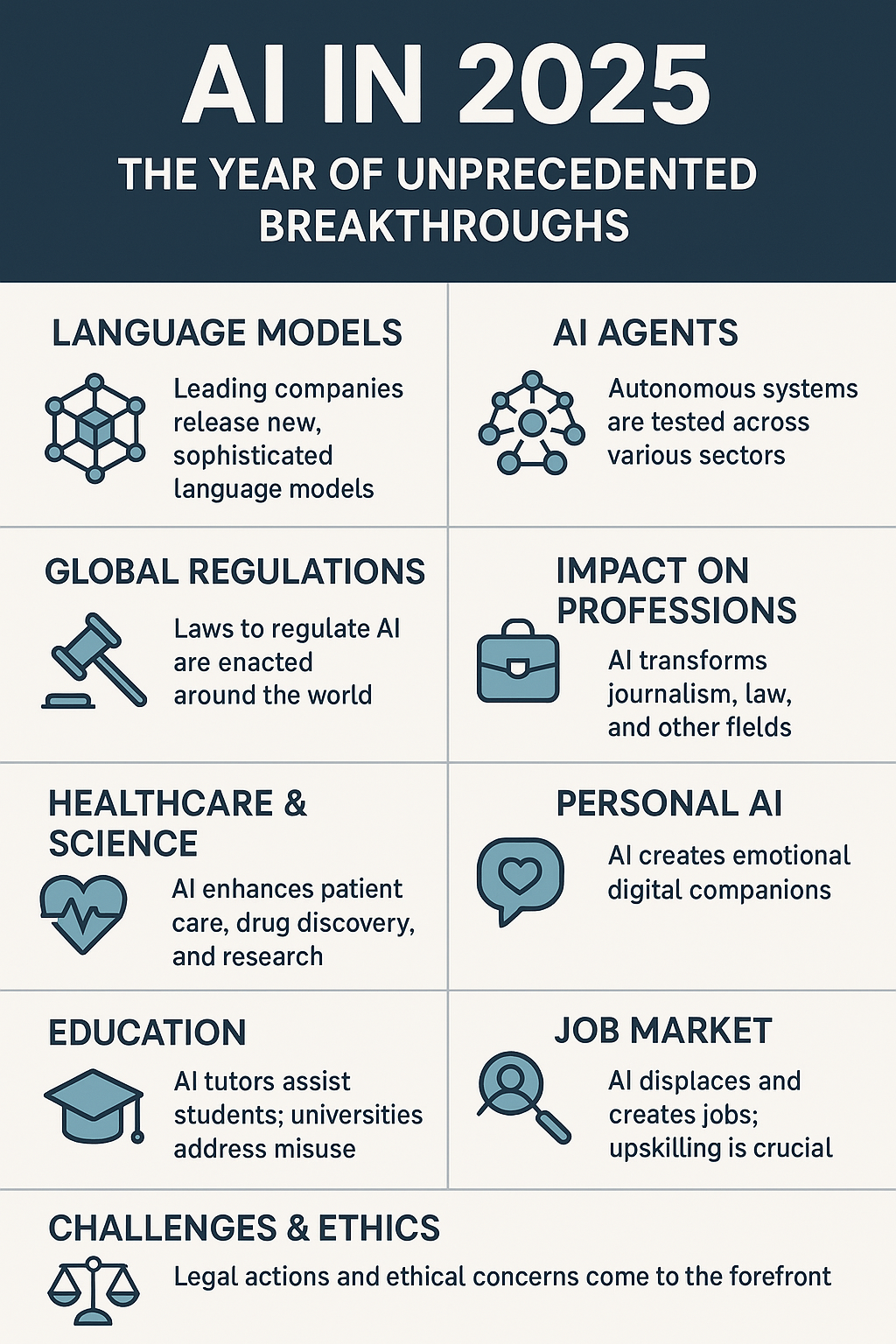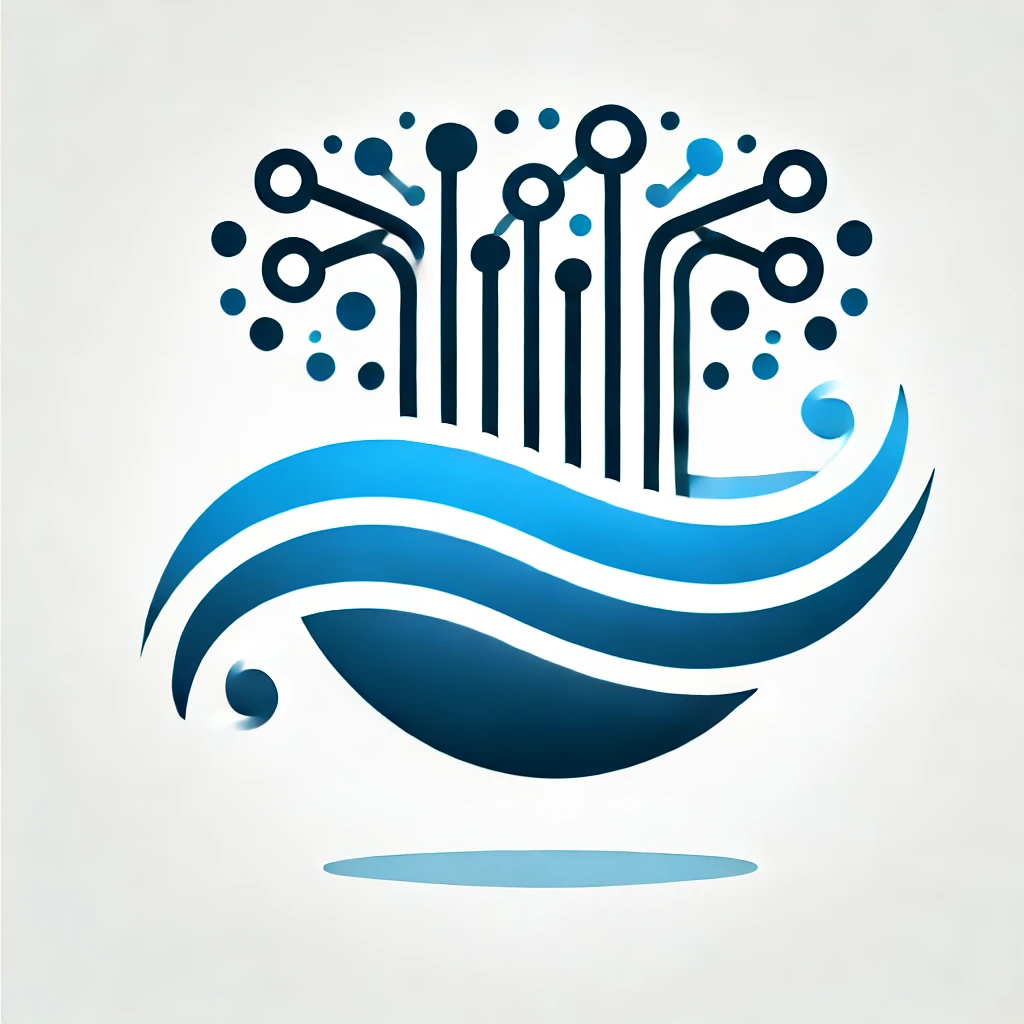AI in 2025: The Year of Unprecedented Breakthroughs

By The Colmarsol Team
March 26, 2025
The artificial intelligence landscape continues its dramatic evolution in 2025, with groundbreaking developments that are reshaping industries, transforming professions, and blurring the lines between human and machine capabilities. From strategic business partnerships to stunning technological leaps, here's a comprehensive look at how AI is revolutionizing our world.
The Language Model Arms Race Intensifies
The competition among tech giants to develop increasingly sophisticated language models has reached new heights this year.
Google's Gemini 2.5 has emerged as a formidable contender, reportedly outperforming models from Microsoft-backed OpenAI. Available to developers and Gemini Advanced users, with plans for further cloud-computing integration, this model showcases impressive capabilities in code generation, reasoning, and image understanding. Its advanced architecture allows for more nuanced and human-like interactions.
Meanwhile, OpenAI continues to refine its offerings, with GPT-4o demonstrating significant advancements in factual accuracy and creative output. The company is actively exploring AI applications in scientific discovery and problem-solving, pushing the boundaries of what's possible.
Anthropic, founded by former OpenAI researchers, has doubled down on its commitment to safety and ethics. Their Claude model emphasizes responsible AI practices while minimizing potential biases and harmful outputs. In a significant business move, Anthropic has entered a five-year, $100 million agreement with data analytics firm Databricks. This partnership aims to provide AI tools to businesses developing their own AI agents, positioning both companies to compete with industry leaders like Amazon, Microsoft, and Google.
The Rise of AI Agents
Perhaps the most significant trend of 2025 is the emergence of autonomous AI agents capable of performing complex tasks, achieving goals, and adapting to changing environments. These systems are finding applications across various sectors, from customer service and virtual assistants to supply chain management and personalized medicine.
Amazon is at the forefront of this trend, testing two new AI tools: a personalized shopping assistant called "Interests" and a health-focused chatbot named "Health AI." The "Interests" feature enables consumers to use everyday language to create personalized shopping prompts, while "Health AI" provides health information and guidance, assisting customers in finding products and solutions for their healthcare needs.
While the potential of AI agents is immense, challenges in ensuring their reliability, safety, and ethical deployment remain crucial areas of focus for developers and regulators alike.
Global AI Regulations Take Effect
Following years of preparation, the European Union's comprehensive AI Act has now entered its full enforcement phase. Companies operating in the EU market have scrambled to ensure compliance with the tiered risk-based approach that classifies AI systems according to their potential harm. The law's implementation has already triggered similar regulatory frameworks in Canada, Japan, and several Southeast Asian nations.
In the United States, the National AI Initiative has continued with bipartisan support, with new federal guidelines for high-risk AI applications being implemented across sectors including healthcare, transportation, and financial services.
AI's Transformation of Professional Fields
The impact of AI on traditional professions is becoming increasingly apparent. Leaders in the AI field predict that traditional lawyers may become obsolete by 2035 due to advancements in artificial general intelligence (AGI). AGI's capability to perform tasks such as advising, negotiating, and dispute resolution could automate complex legal functions, challenging the traditional role of human lawyers.
In journalism, Italian newspaper Il Foglio published an edition created entirely by artificial intelligence. This four-page supplement, called Il Foglio AI, demonstrates AI's potential impact by generating articles on various topics without human intervention, raising questions about the future of content creation.
The scientific community is witnessing both benefits and challenges from AI integration. The increasing use of AI software in reviewing academic papers has sparked both interest and concern. While AI can enhance efficiency in the peer review process, there are apprehensions about its ability to evaluate complex research adequately.
Healthcare and Scientific Breakthroughs
AI-assisted diagnostic tools have become standard in many hospitals worldwide, with several systems receiving full regulatory approval for autonomous preliminary diagnoses. A standout development has been the deployment of AI systems that can predict patient deterioration up to 48 hours before clinical signs become apparent, dramatically improving outcomes in intensive care settings.
Drug discovery continues to be revolutionized by AI, with AI-powered tools accelerating the process by analyzing vast datasets, identifying potential drug candidates, and predicting their efficacy. The first fully AI-discovered compound for treating a rare neurological disorder has entered Phase 3 clinical trials, potentially cutting years off the traditional drug development timeline.
Beyond healthcare, AI is making significant contributions to climate change research, enabling more accurate modeling of climate patterns, prediction of extreme weather events, and development of efficient renewable energy solutions. In material science, AI is facilitating the discovery of new materials with enhanced properties, paving the way for advancements in electronics and medicine.
The Personal Side of AI
In a remarkable demonstration of AI's potential to serve deeply personal needs, Alan Hamel, widower of actress Suzanne Somers, collaborated with Realbotix Corp and Hollo.AI to create an AI robot that replicates Somers' voice and speech patterns. This "digital twin" recalls special moments from their life together, showcasing AI's potential in preserving personal memories and emotional connections.
While this application highlights the profound emotional possibilities of AI, it also raises important questions about digital immortality and the psychological implications of maintaining relationships with AI versions of deceased loved ones.
Educational Transformation
The integration of AI tutoring systems into educational institutions has expanded dramatically, with personalized learning plans now standard in many K-12 schools. These systems adapt in real-time to student progress, identifying knowledge gaps and tailoring content delivery to individual learning styles.
Meanwhile, universities have implemented sophisticated plagiarism detection systems to counter the widespread use of AI writing tools, while simultaneously incorporating AI literacy into core curricula across disciplines.
Labor Market Adjustments
The impact of AI on employment continues to evolve in complex ways. While certain sectors have seen job displacement, particularly in data entry, customer service, and basic programming tasks, new positions in AI oversight, prompt engineering, and human-AI collaboration have emerged.
The automation of routine tasks is freeing up human workers to focus on more creative and strategic endeavors, but this shift necessitates a focus on upskilling and reskilling the workforce to adapt to the evolving job market. New job roles are emerging at the intersection of AI and various domains, creating fresh opportunities for skilled professionals.
Challenges and Controversies
Despite the remarkable progress, the AI sector is not without its challenges. Apple faces a lawsuit alleging false advertising over delays in delivering promised AI features for its iPhone 16. Customers claim that Apple misled consumers by overstating the AI capabilities of the device, highlighting the challenges tech companies face in meeting AI expectations.
Ethical considerations remain paramount as AI capabilities continue to grow. Efforts to mitigate biases in AI algorithms and ensure fair and equitable outcomes for all users are ongoing priorities. Increasing transparency in AI decision-making is crucial to build trust and ensure accountability, while safeguarding user data and protecting privacy are critical concerns as AI systems increasingly rely on large datasets.
Looking Ahead
As we move further into 2025, the tension between rapid AI development and the need for appropriate safeguards continues to define the field. With the technology becoming increasingly embedded in critical infrastructure and daily life, questions of governance, equity of access, and the long-term trajectory of human-AI coexistence remain at the forefront of global conversation.
While the transformative potential of AI has never been clearer, so too have the challenges of ensuring these powerful tools serve humanity's best interests. The coming months will likely bring further developments that continue to test our collective ability to harness this technology responsibly.
Note: This article provides a general overview of AI advancements in 2025 based on current trends and projections. The actual pace and direction of AI development may vary.
